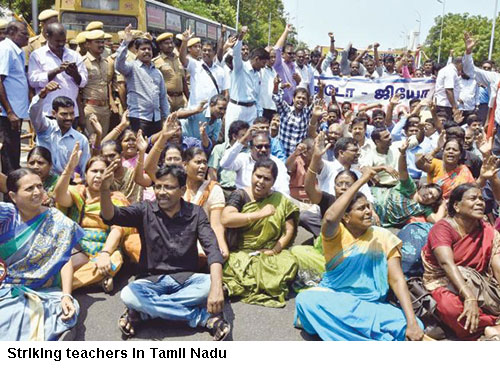 An indefinite strike called by the Joint Action Council of Tamil Nadu Teachers’ Organisation and Government Employees Organisation (JACTTO-GEO) on January 22, supported by over 700,000 government school teachers and public sector employees ended with a whimper on January 30. The incumbent Edappadi K. Palaniswami-led All India Anna Dravida Munnetra Kazhagam (AIADMK) state government firmly refused to yield to their demands.
An indefinite strike called by the Joint Action Council of Tamil Nadu Teachers’ Organisation and Government Employees Organisation (JACTTO-GEO) on January 22, supported by over 700,000 government school teachers and public sector employees ended with a whimper on January 30. The incumbent Edappadi K. Palaniswami-led All India Anna Dravida Munnetra Kazhagam (AIADMK) state government firmly refused to yield to their demands.
On the contrary exhibiting unusual resolve, the state government started recruiting temporary teachers to replace the striking teachers and suspended 422. But the decisive factor in the government’s stick and carrot policy was an offer to transfer the striking teachers to places of their choice. The end result was that on the ninth day, 95 percent of teachers and government employees resumed work, forcing JACTTO-GEO to call off the mammoth strike.
But although government school teachers are back in their classes, they still believe their unmet demands are justified. Among the main demands: scrapping of the contributory pension scheme (CPS) introduced in 2003 and revival of the predecessor completely state-funded pension scheme; speedy disbursement of arrears after the state government accepted the Seventh Pay Commission recommendations in October 2017; regularisation of services of contract teachers; hiking salaries of primary teachers with double degrees on a par with their Central government counterparts; reversing mergers of primary with secondary schools; and refraining from appointing double degree teachers to teach in kindergartens.
Confronted with this charter of demands from government school teachers, the AIADMK government resolutely refused to revive the old pension scheme, pay Seventh Pay Commission arrears or raise teacher pay scales pleading that it is struggling to contain its budget deficit of Rs.14,300 crore. In a written response to JACTTO-GEO, D. Jayakumar, minister for fisheries, personnel and administrative reforms, said the state government allocates 71 percent of its tax revenue towards salaries and pensions of teachers and government employees. After adding administrative expenses and interest on loans, a mere 29 percent is available for social welfare programmes.
Informed educationists are of the opinion that the current face-off between teachers unions and the state government is the outcome of vote bank politics played by Tamil Nadu’s two major political parties (AIADMK and DMK) which have been voted to power alternately in Tamil Nadu for decades. In the run-up to state legislative assembly elections in 2011 and 2016, the AIADMK had assured teachers unions that the old government-funded pension scheme would be revived and recklessly promised to pay Seventh Pay Commission salaries retrospectively from January 1, 2016 although it is not mandatory for state governments to do so.
“Relative to national income per capita, government school teachers are very well paid, but they are always clamouring for more. Although teachers who joined after 2003 agreed to CPS under which employees and the state government would jointly contribute to the pension fund, they have since reversed their stand. They should realise that since their salaries have increased manifold after implementation of the Seventh Pay Commission scales in October 2017, it is not feasible for the government to revert to the old pension scheme or pay Seventh Pay Commission arrears. It’s time the teachers community accepted the idea of performance rather than seniority-based increments and promotions,” says Senthil Arumugham, general-secretary of Satta Panchayat Iyakkam, a citizens’ movement for good governance.
According to the Annual Status of Education Report 2018 released in Delhi on January 15, 54 percent of class V and 25 percent of class VIII students in Tamil Nadu’s government schools cannot read and grasp class II textbooks written in Tamil or any other language. Worse, 73 percent of class V and 51 percent of class VIII government school students can’t get simple three-digits-by-one digit division sums right. Tamil Nadu’s disgruntled government school teachers need to worry about these numbers as well.
Hemalatha Raghupathi (Chennai)























